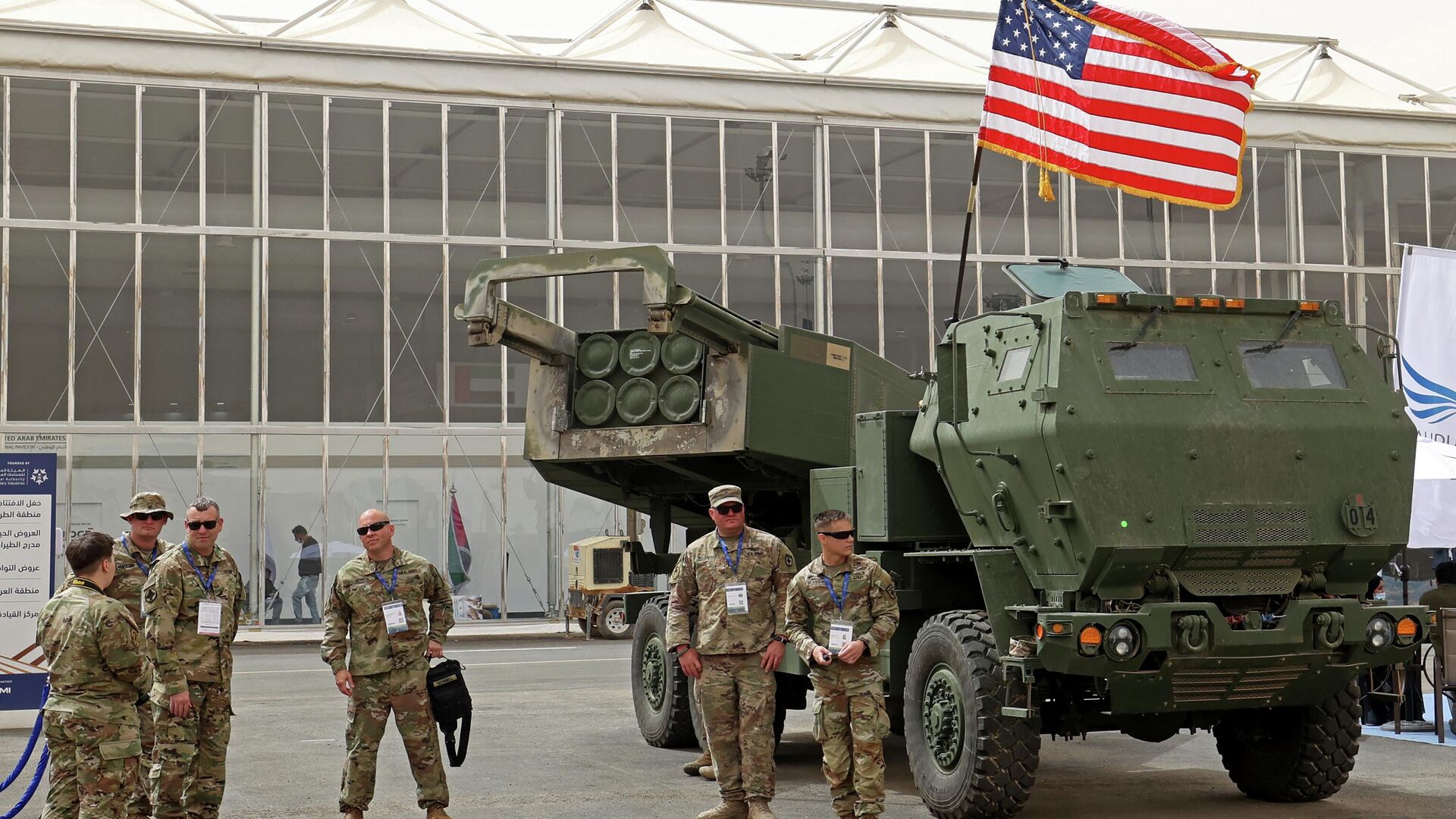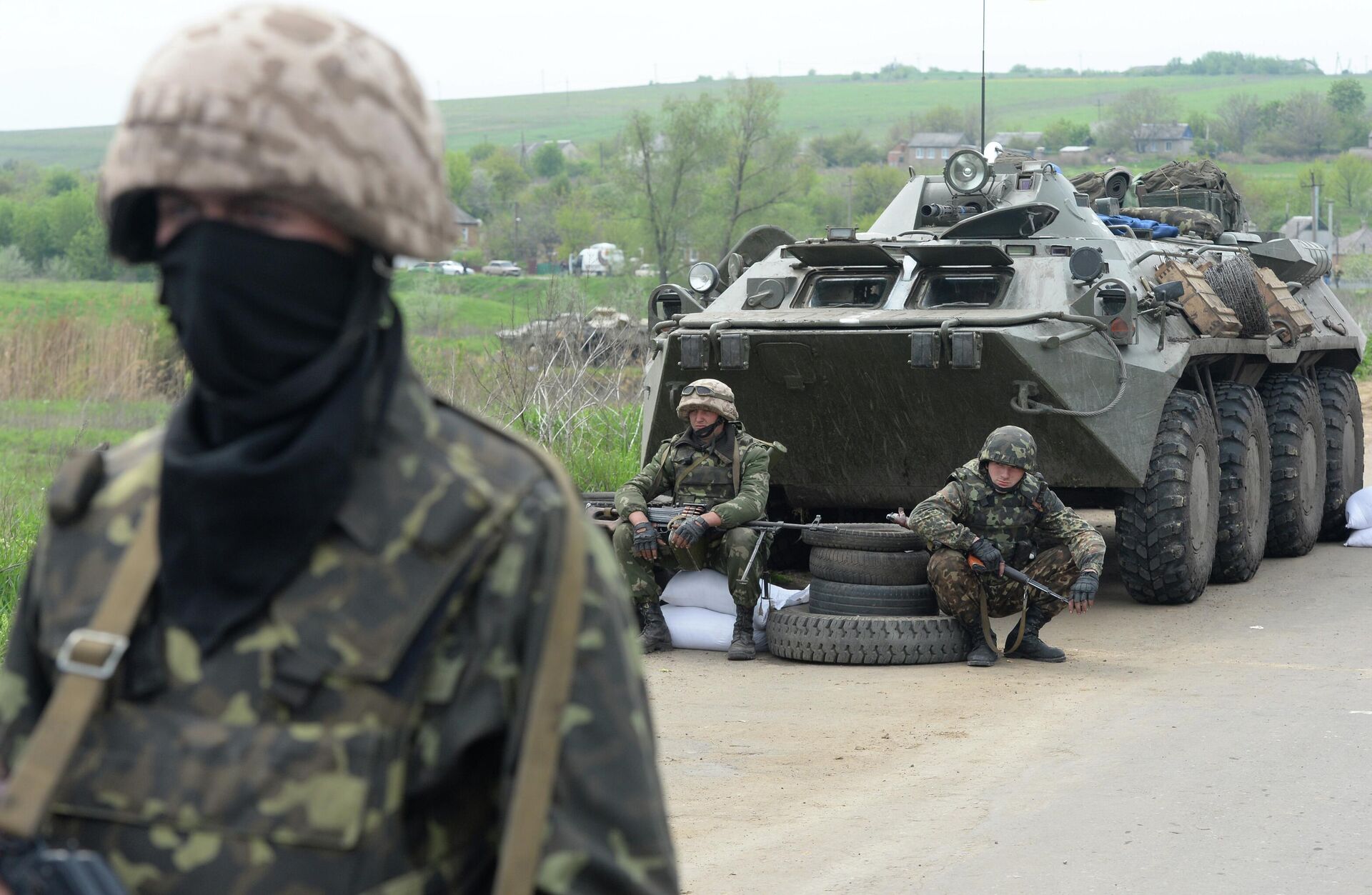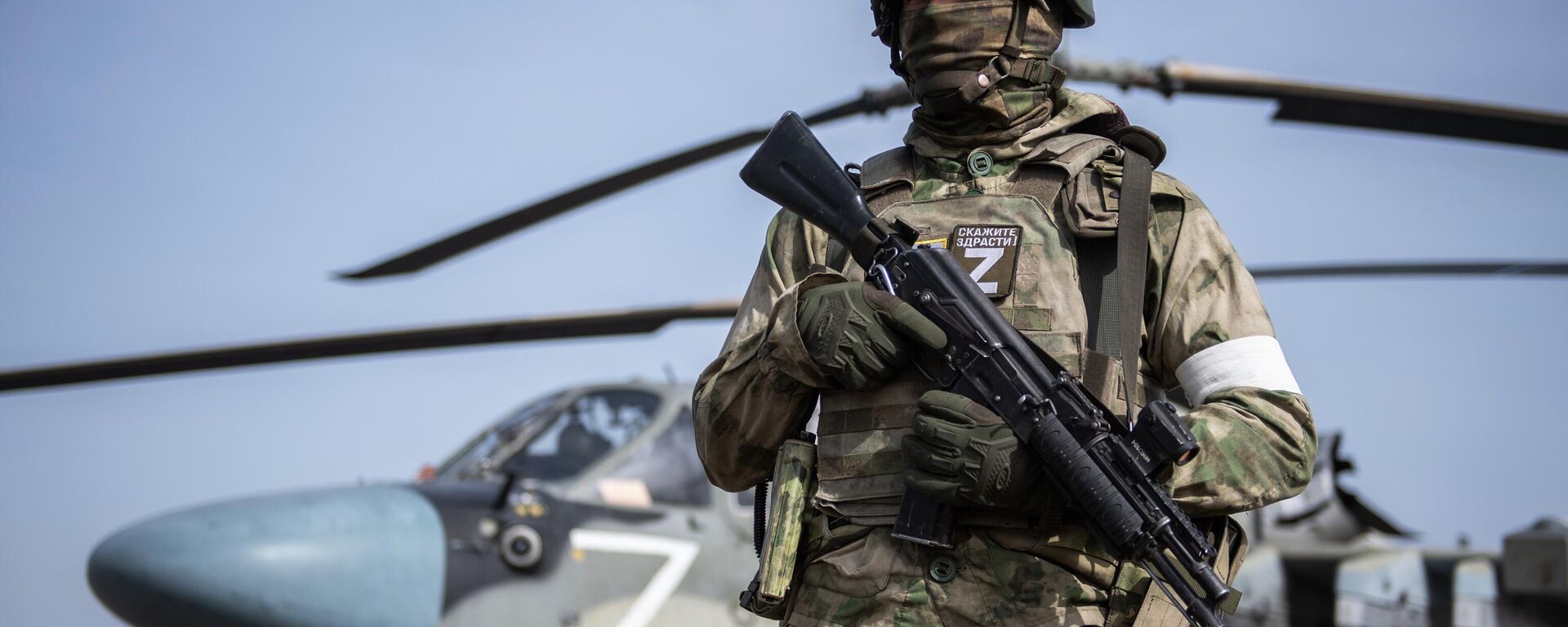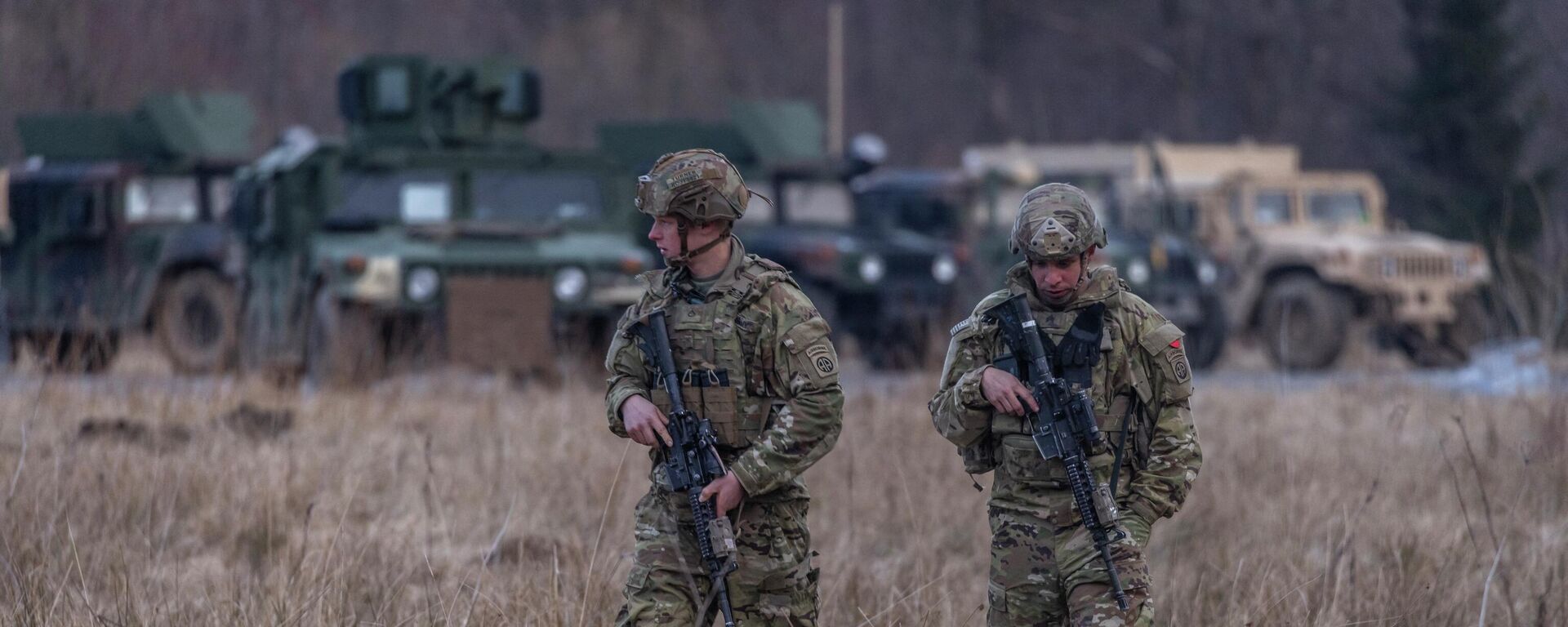Ex-CIA Analyst: US Military Aid Not a Game Changer for Kiev, Ukraine Has Already Lost
16:31 GMT 06.06.2022 (Updated: 13:36 GMT 06.08.2022)

© AFP 2023 / FAYEZ NURELDINE
Subscribe
US military aid won't change the status quo on the battlefield, says former CIA analyst Larry Johnson. At the same time, Washington's involvement in the Ukraine standoff has already backfired on the US economy and put the dollar currency in jeopardy, according to him.
The US is providing Ukraine with significant amount of weaponry and ammunition to strengthen Kiev's position at the negotiating table, claimed President Joe Biden in his 31 May op-ed for The New York Times.
David Arakhamia, a member of Ukraine’s negotiating team with Russia, echoed Biden's position on 4 June, stressing that Kiev will resume peace talks only after advanced weaponry arrives from Western allies.
Meanwhile, in recent weeks the US and its allies have placed "a renewed emphasis on the need for a negotiated settlement" to end the conflict, according to CNN.
The emerging push for a negotiated peace is an acknowledgment that Kiev has lost the war, says Larry Johnson, a veteran of the CIA and the State Department’s Office of Counter Terrorism, which provided training to the US Military’s Special Operations taskforce for 24 years.
Sputnik: Joe Biden authorised the delivery of the first batch of HIMARS to Ukraine. The White House is due to send even more weapons to Kiev after the passage of a $40 billion military aid package. Will this aid become a game-changer? Why?
Larry Johnson: No, I do not think that the aid will be a “game-changer”. It may prolong some of the fighting, but the problem for the Ukrainian military is they do not have intact manoeuvre units. And what I mean by that is they don't have armoured units that can be dispatched from one point to another supported by an infantry column that can then carry out an attack against a fixed Russian position.
The Ukrainian strategy and tactics up to this point have been to simply entrench themselves in defended positions and try to stop Russians that way. What Russia is doing is going very methodically in blowing them up and using artillery to destroy these positions. If anything, this may intensify the conflict and lead to strikes on government centres in Kiev that at this point Russia has shied away from.
Sputnik: On 28 May you drew attention to the fact that at least 12 Ukrainian units appeared to have rebelled against their chain of command. In "rebellious" videos posted on social media platforms, the Ukrainian troops complained about not being properly supplied with the weapons and equipment they need to fight. What message do these videos send to Kiev and the West?
Larry Johnson: The message is coming out. These appear to be largely Territorial Defence Forces. These are not full-time soldiers up to this point. But when there is an emergency or an outbreak of conflict, they are called up and sent in. Part of the reason for the lack of resupply goes to the effectiveness, I believe, of the Russian aerial attacks, both with fixed-wing aircraft and with missiles, rockets, against rail lines, against supply depots, against military bases that are in western Ukraine.
The soldiers, the fact that they're speaking out like this is remarkable, because it is rebellion, and to rebel in such a way as to open yourself to charges, to being court-martialled and possibly executed or imprisoned. So the fact that you have so many elements, not just one person from each unit - it is the entire unit or a significant number of the unit in each of these cases standing by in support of a spokesman designated to read their list of demands. Their complaint is simply one other indicator of the problems that are underway for the Ukrainian military, that it fails to operate effectively.

Ukrainian troops near the village of Andre'evskoye outside Slavyansk, where local residents blocked a convoy of Ukrainian army armoured personnel carriers. 2 May 2014.
© Sputnik / Mikhail Voskresensky
/ Sputnik: What's behind the logistical mess?
Larry Johnson: Part of it is the success of Russian attacks on critical resupply points. When you're blowing up fuel depots or when you're hitting supply bases, the material that comes in from the United States or from NATO has to be brought to one point or a variety of points, where it's gathered and then from there it's prepared and then distributed to units.
Then that distribution process relies upon trucks and trains. There is no aerial resupply, and many of the electrical systems for the electric trains have been destroyed, so it appears the Ukrainians are having to rely upon some diesel lines, and many of those rail lines themselves have been destroyed. You're not going to get a column of trucks going out.
The Ukrainians are having to disguise what they're doing, they are using FedEx, UPS, and other commercial means of delivery to try to provide those supplies. And then you've got the reality that the Russians have cut most of the road networks going into Donbass, where these troops are located who need to be resupplied. That combination of factors with pure old-fashioned incompetence on the part of Zelensky's administration.
Sputnik: The US State Department has acknowledged that it has spent billions of dollars on training and equipping the Ukrainian Army over the past eight years. Why did this not prevent the best-equipped and hard-core battalions from surrendering in Mariupol? Why isn't US-NATO aid preventing the Armed Forces of Ukraine from retreating in Donbass amid the push of a smaller Russian military contingent?
Larry Johnson: Training is perishable in two ways. The training that took place eight years ago is not necessarily fresh in anyone's mind today, number one. Number two, many of the units and personnel that were trained have been killed, wounded, or captured. So, no matter what training they received, it's just no longer applicable. Training new personnel is not something that happens within a week or even two weeks.
Just look at basic infantry training: it is usually a 10-week process, and then additional training to get more specialised skills would encompass another four to eight weeks. Right there you’ve got the time factor. In addition, the people who are going to be trained in the future, if that takes place, it's not going to happen in Ukraine. It's going to happen in Poland or Germany. It's not going to happen in Ukraine.
Sputnik: Earlier, in Davos, ex-Secretary of State Henry Kissinger called for a peace settlement with Russia. In response, Ukrainians placed him on the extremist list "Mirotvorets". What's behind the arrogance of the Ukrainian elites?
Larry Johnson: I'm not sure if it's arrogance, or delusion, self-deception, but clearly the reality of what's taking place on the ground starting to sink in. I notice that now reports have started to emerge in the last 24 hours of the United States and the United Kingdom beginning to step up and put pressure for talks with Russia to get a ceasefire. But the only reason for the ceasefire is that Russia is crushing the Ukrainian military. It has always fought, I believe, to surround and destroy several units in the east in what are called “cauldrons”.
The push now for a negotiated peace is simply an acknowledgment that Ukraine has lost the war. I think it remains to be seen whether or not there is a split between the political leadership of Zelensky and the military leaders. At some point, those military leaders, if they have any regard at all for their troops, will come to the realisation that they are unnecessarily sacrificing the lives of young men and middle-aged men.
Much of the call-up, they've got people that are in their 40s and 50s being called to the frontlines to fight. And that goes back to one of your earlier questions about these units that rebel, that refuse to carry out orders that they see as suicidal. There is clearly the situation of what's taking place on the ground dictating or driving change in the politics.
Sputnik: Is Kissinger alone or is a "rebellion" taking shape within the US foreign policy establishment?
Larry Johnson: There is no unanimity or consensus within the US foreign policy establishment. So Kissinger represents, let's call it, the old school, apart from the fact that he is extremely old. He still represents an approach that was dominant in Washington in the seventies, in the eighties and into the nineties. The neocon element, which is insisting on and really pushing for this war, their voice has been certainly the loudest up to now. So Kissinger surfacing with this is, I think, part of the let's call it the really old guard trying to reassert itself getting back to something that would approximate more normal relationships with Russia.
And I think that the fact that the attempt to impose the sanctions on Russia have backfired, that is creating more economic problems and chaos in Europe and in the United States than it is in Russia, that there is a growing realization that, one, Russia will prevail militarily in Ukraine, but more importantly, Russia will prevail economically and be in a position that, frankly, the United States is not. The United States is not self-sufficient; Russia is.
And so I think Kissinger is grasping that reality and recognises that if the United States continues on this path of just pushing for the war with Ukraine and trying to sustain that, it's going to have repercussions that will be very harmful to the United States and erode its position of being a world leader, financially, militarily and politically.
Sputnik: Will the US lose anything in terms of money, security, prestige, and fame if it backs down and strikes a deal with Russia to make Ukraine a permanently neutral state as is enshrined in Ukraine's Declaration of Sovereignty of 1990?
Larry Johnson: The losses that the United States is suffering from this disaster are… I don't think we’re beginning to see the full extent of it. Economically, in particular, the United States is imperilled. The actions the United States took, along with other members of the European community, to try to punish and sanction Russia, and particularly banning Russia from the use of SWIFT, has put the role of the US currency in jeopardy as the international reserve currency. Russia, China, India, Brazil are already in the process of restructuring an alternative international economy and that international economy no longer requires dependence on the US dollar. So the US is almost on the threshold of a significant rise in inflation. We've already seen some, but it's going to get worse. On top of this, the shortages that have been imposed, shortages of critical items like oil, gas, fertilisers, aluminium, things that Western industry and manufacturers depend on.



